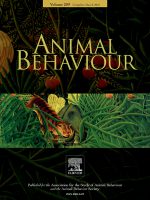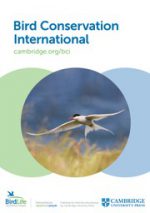Peter Carr MRes., Ph.D.
Profile
The focus of my work going forward is to bring about the “rewilding” of the archipelago. Involving several other stakeholders, this hugely ambitious project aims to eradicate invasive rats from the northern atolls and manage the abandoned coconut plantations on these rat-infested islands. This will facilitate a more natural terrestrial habitat conducive to native flora and fauna. It is predicted that this ecological intervention will result in a substantial increase in the internationally important breeding populations of seabirds and this in turn has benefits across ecosystems including nearshore coral reefs.
Rewilding the Chagos Archipelago is no longer a green dream, it is a matter of political goodwill and funding
Biography
My Project
Other interests
Rats were introduced in to the Chagos Archipelago by man. Alongside native habitat destruction as a consequence of coconut farming, these two factors have caused cataclysmic declines in the numbers of seabirds breeding in the archipelago over a period of less than 150 years. I managed the successful eradication of rats from three islands in the Chagos MPA in 2014 and I am currently the team leader in the largest eradication of rats and mice from an inhabited island (Lord Howe, Australia).
I am also the author of Birds of the British Indian Ocean Territory.
My Publications

Homing Navigation is Optimized to Diurnal Constraints in a Tropical Seabird, the Red-Footed Booby
Coste, J., Votier, S.C., Dunn, R.E., Freeman, R., Nicoll, M.A., Carr, P., Wood, H., Trevail, A.M. (2025). Homing navigation is optimized to diurnal constraints in a tropical seabird, the red-footed booby. Animal Behaviour.

Comparable Foraging Effort and Habitat Use Between Two Geographically Proximate Tropical Seabird Colonies
Trevail, A.M., Vallocchia, S., Nicoll, M.A.C., Carr, P., Votier, S.C., Wood, H., Freeman, R. (2024). Comparable foraging effort and habitat use between two geographically proximate tropical seabird colonies. Marine Biology.

Geolocation and Immersion Loggers Reveal Year-Round Residency and Facilitate Nutrient Deposition Rate Estimation of Adult Red-Footed Boobies in the Chagos Archipelago, Tropical Indian Ocean
Votier, S.C., Corcoran, G., Carr, P., Dunn, R.E., Freeman, R., Nicoll, M.A.C., Wood, H., Trevail, A.M. (2024). Geolocation and immersion loggers reveal year-round residency and facilitate nutrient deposition rate estimation of adult red-footed boobies in the Chagos Archipelago, tropical Indian Ocean. Journal of Avian Biology.

Island Restoration to Rebuild Seabird Populations and Amplify Coral Reef Functioning
Dunn, R.E., Benkwitt, C.E., Maury, O., Barrier, N., Carr, P., Graham, N.A.J. (2024). Island restoration to rebuild seabird populations and amplify coral reef functioning. Conservation Biology.

Horizon Scanning for Invasive Non-Native Species Across a Global Network of Small Islands and Archipelagos
Dawson, W., Peyton, J., Pescott, O., Adriaens, T., Cottier-Cook, E., Frohlich, D., Key, J., Malumphy, C., Martinou, A., Minchin, D., Moore, N., Rabitsch, W., Rorke, E. S. T., Turvey, K., Barnes, D. I., Baum, D., Bensusan, K., Burton, F., Carr, P., Convey, P., Copeland, A., Fa, D., Fowler, L., Garcia-Berthou, E., Gonzalenz, A., Gonzalez-Moreno, P., Gray, A., Griffiths, R. (2023). Horizon Scanning for invasive non-native species across a global network of small islands and archipelagos. Global Change Biology.





